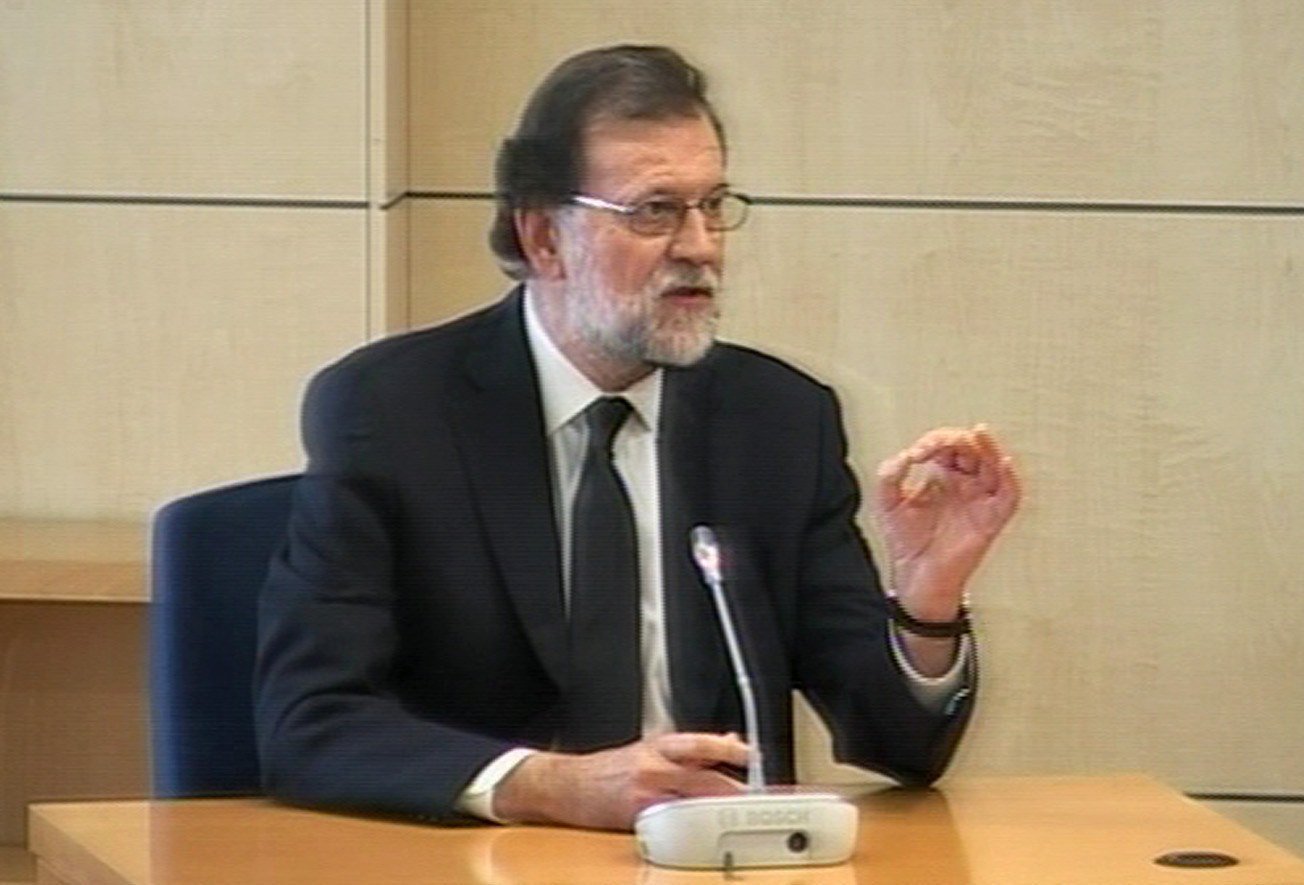He knew nothing of "any illegal funding" of the Popular Party (PP), nor the businessman Francisco Correa, "beyond greeting him during a public event", nor did he receive 'cash in envelopes' whilst secretary general of the PP or leader of the party, and neither did he attend any debate about the accounts in the time of the party's former treasurer, Luis Bárcenas, nor in his 30 years with the PP, since the duties of citizen Mariano Rajoy at the head of the first party of Spain were limited to "political, non acccounting matters", he insisted on a number of occasions in front of the high court during his two hour declaration in the Gürtel corruption case.
Rajoy arrived on Wednesday at the courthouse in San Fernando of Henares (Madrid) by entering through the garage to avoid the protests that the Coordinator 25-S group had organised at the front door with whistles and banners. Once in the building, the Spanish Prime Minister approached the trial room with a firm step, and sat at the right of the court with his hands interlocked, taking a moment to display the manner of a parliamentarian to break the solemnity of the moment. "Look, I was a politician and continue being one," he observed before commencing the session, and raising laughter from some of the attendees.
Rajoy denied the declarations of Bárcenas in court. In the first place, he labelled it "as absolutely false" the presumed slush fund to top up the salaries of party leaders that the former treasurer has attributed to PP members. "We earned a salary as deputies and we had a bonus that was declared in the Treasury. We stopped receiving it once we entered the government," said Rajoy, repeating the same thesis as the current treasurer of the PP, Carmen Navarro, in her appearance in the Chamber of Deputies two weeks ago. Secondly, Rajoy stated that the PP did not receive any "donation" from individuals or companies, which would be illegal.
Asked about the paperwork of Bárcenas, Rajoy denied that he endorsed the legality of assets of any account in Switzerland. Rajoy was then asked to explain his later relationship with his former treasurer, who he says he did not speak to again after sending him a text message that read, "Luis, be strong", neither calling him directly, nor through a third party. "One sends many messages, but that doesn't mean anything," he said. Asked to clarify what he meant by the phrase that the party was "doing what we can", Rajoy did not shy away from responding with a smile, stating that it meant "doing what we can", but "not anything that might have prejudiced any investigation".
Against Aguirre, again
The point was that Rajoy was not sitting in court for the case of Luis Bárcenas (and being the first Spanish Prime Minister to be doing so), but for the period of 1999-2005 in the Gürtel corruption case for another personality: Francisco Correa.
The leader of the government stated that he did not know Correa personally, nor his businesses, beyond maybe "only and exclusively to greet him at a public event". His argument was that he was not responsible for the party's economic matters, "something that is understood very well" because the separation of duties was "clear", and, moreover, he had not run a party campaign for 27 years ago. "Things are as they are and not as one would want them to be," the lawyer from ADADE (Association of Democrat Lawyers of Europe), linked to the PSOE, remarked.
Even so, the Spanish Prime Minister decided to cut the relationship with Correa in 2004 for the services that he offered to the party. He said that he was informed by the ex-treasurer, Alvaro Lapuerta, that some businessmen were using the name of the PP. He asked if there was anything illegal, and Lapuerta ensured him of the absence of any "evidence" in that regard. Thus, responsibility has been upon the ex-treasurer who has not yet appeared in the investigation into the alleged existence of the secret accounting system (the caja B) at the PP, for reasons of health. Navarro, Ángel Sanchís and Rosendo Naseiro have done so up to now.
Later, the Spanish Prime Minister attacked one of his political archenemies, the former president of the Community of Madrid. He said he met with Esperanza Aguirre regarding the corruption scandals in the districts of Majadahonda and Pozuelo de Alarcón, and asked Aguirre to take care of the matter "because it was her duty", again shaking off the responsibility. He concluded by stating that he could not recall "ever" attending a debate about the party's finances in 30 years, and that the information was referred directly to the National Audit office.

